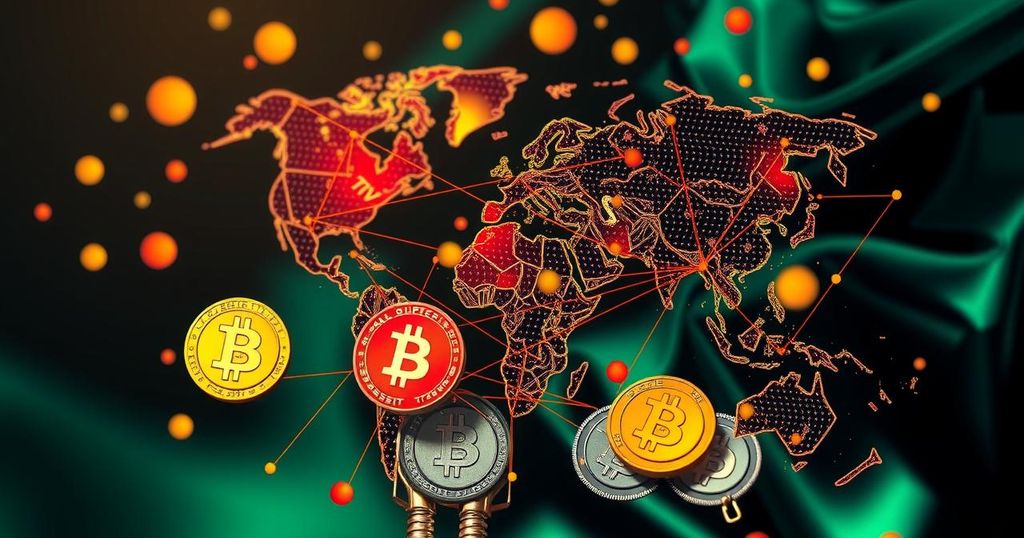Nigeria and South Africa: Pioneers in Global Digital Asset Ownership
Nigeria and South Africa lead in global digital asset ownership, according to the Consensys Web3 Perception report, showing that 99% of Nigerians are aware of digital assets and 77% possess a full understanding. 74% of Nigerians have owned digital assets, with 42% still holding them. South Africa follows with 68% having owned digital assets and 22% currently holding them. Concerns remain regarding financial systems, volatility, and security in digital asset transactions.
A recent report from blockchain incubator Consensys has established Nigeria and South Africa as global leaders in the realm of digital asset ownership. The findings indicate that an impressive 99% of Nigerians are familiar with digital assets, with 77% expressing a comprehensive understanding of the concept. This contrasts sharply with developed economies such as the United States and the United Kingdom, where only 54% and 45% of respondents, respectively, have a clear grasp of digital assets. Among respondents in Nigeria, 74% have owned digital assets at some point, and 42% of them continue to do so.
In addition to high ownership rates, Nigerian respondents also display notable familiarity with innovative blockchain concepts, including Web3 and non-fungible tokens (NFTs). The report reveals that 58% of Nigerian participants consider themselves either very or fairly familiar with NFTs. South Africa follows closely behind, with 68% of its respondents having owned digital assets, though a lesser 22% retain ownership at present. Approximately half of South Africans reported familiarity with both Web3 and NFTs.
Such elevated ownership rates in these leading African economies are reflective of the broader sentiment toward traditional banking systems. In South Africa, for instance, 65% of those surveyed believe that there is a need for improvement or an overhaul of the existing financial system. Trust in Nigeria’s banking system is even more tenuous, with only 10% of respondents expressing satisfaction with its efficacy.
Joseph Lubin, the CEO of Consensys, noted that Nigerians are pursuing digital assets not only for transactional purposes but also for enhanced control over their digital identities. He stated that, “In terms of data privacy, 92 percent of Nigerians and 87 percent would like to have more control over their identity on the internet, while over half of respondents think that decentralization could improve traditional banking and social media platforms.”
Moreover, Nigerians express a desire to benefit from the profits generated from their personal data, a goal they believe could be realized through blockchain technologies. Consistently, Nigeria has led Africa in blockchain adoption and was recently ranked second globally for digital asset adoption, trailing only India.
Nonetheless, concerns persist regarding the volatility of digital assets, with over half of Nigerians identifying this as a key barrier to adoption. Other significant drawbacks cited include fears of scams, privacy issues, and security risks. As these nations navigate the evolving landscape of digital assets and financial technologies, it remains crucial to address these apprehensions while harnessing the potential they offer.
The rise of digital assets and blockchain technologies has sparked significant interest across the globe, with many individuals and nations exploring decentralized financial solutions. Nigeria and South Africa, the two largest economies on the African continent, have emerged as pioneers in digital asset ownership. This shift is particularly noteworthy in light of widespread distrust in traditional banking systems, alongside the increasing awareness and understanding of digital currencies among the populace. As blockchain and digital asset adoption continues to grow, understanding the sentiments and challenges faced by these nations becomes essential for a comprehensive evaluation of the future of finance.
In summary, Nigeria and South Africa have established themselves as leaders in global digital currency ownership, with a high percentage of their populations aware of and engaged with digital assets. This trend reflects a growing discontent with traditional banking systems and a desire for greater control over personal data and finances. However, issues such as volatility and security concerns pose challenges that need to be addressed. These findings underscore the transformative potential of blockchain technology within these economies in the future.
Original Source: coingeek.com




Post Comment